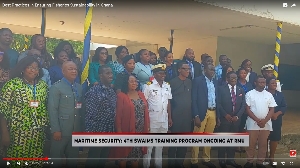 Maritime Security: 4th SWAIMS Training Program ongoing at RMU
Maritime Security: 4th SWAIMS Training Program ongoing at RMU
2023 recorded 36 incidents of maritime piracy, a sharp decline from 2020, when 132 incidents were recorded.
Even though the region is not out of the woods yet, it is important to note the role maritime domain awareness and training, among other factors, have played in the remarkable decline in maritime insecurities.
As part of the European Union-sponsored Support to the ECOWAS Integrated Maritime Strategy (SWAIMS) project, which was launched in 2016, the Regional Maritime University has been training sea actors, naval and law enforcement officers across West Africa.
The 4th and final edition of this operational training course has commenced at the University to build on the success of previous years.
The specific objectives of the SWAIMS project are to improve regional governance, and legal frameworks, the prosecution and adjudication of maritime crimes and law enforcement operational capabilities among others.
In an opening ceremony last Tuesday for the 6-week long course, the University Registrar, Dr. Baboucarr Njie, representing the Acting Vice Chancellor, Dr. Jethro Brooks Jr., reminded his multinational audience about the severity of maritime insecurities in the region over recent years.
“According to ECOWAS Multi-National Maritime Coronation Center (EMMCC) zone F 2020 annual report, 136 crew members were abducted from 27 kidnapping incidents for the year. This accounted for about 95% of global kidnapping for ransom. Comparatively, the Indian Ocean recorded only 36 incidents of which none were classified as piracy. This made the Gulf of Guinea the most dangerous waters for seafarers worldwide. The growing maritime insecurity has affected the legitimate uses of the sea, impaired the exploitation of coastal resources and continued to undermine regional security as well as the realization of the blue economy potential of the Region”.
The Project Coordinator, Ing. Augustus Addy-Lamptey, rehashed the importance of continuous maritime domain awareness and training as recent events demonstrate the persistence of the enemy at hand.
“There are two main objectives for the SWAIMS project. The first is governance and law enforcement frameworks and prosecution and adjudication of maritime crimes and the next one is law enforcement and operational capacities and responses. This second objective is where the IMO project is located,” he explained.
He told Eye on Port later on that this year’s program will include first-hand interaction with a survivor of a maritime kidnapping incident.
“I must say that because of this project, we can see that the maritime incidents are reducing and we can objectively say that it is because of this project that is why we are seeing such improvements,” Ing. Addy-Lamptey said.
Maritime Law Consultant and Legal Practitioner, Dr. Emmanuel Kofi Mbiah, also called for continued collaboration among regional partners to remain vigilant in this collective approach the countries in the region have embarked on.
“We are not out of the woods, indeed the pirates are still around, the economic conditions in our countries are not good, and consequently they act as fertile grounds for engaging and recruiting people who want to get involved in this nefarious activities. The challenges are still there but we need to be vigilant, we need to keep an open mind, we need to ensure that there is collaboration between the various partners and once the knowledge and information sharing goes on, I am sure we will be able to deal with this in very large proportions and large measures,” he averred.